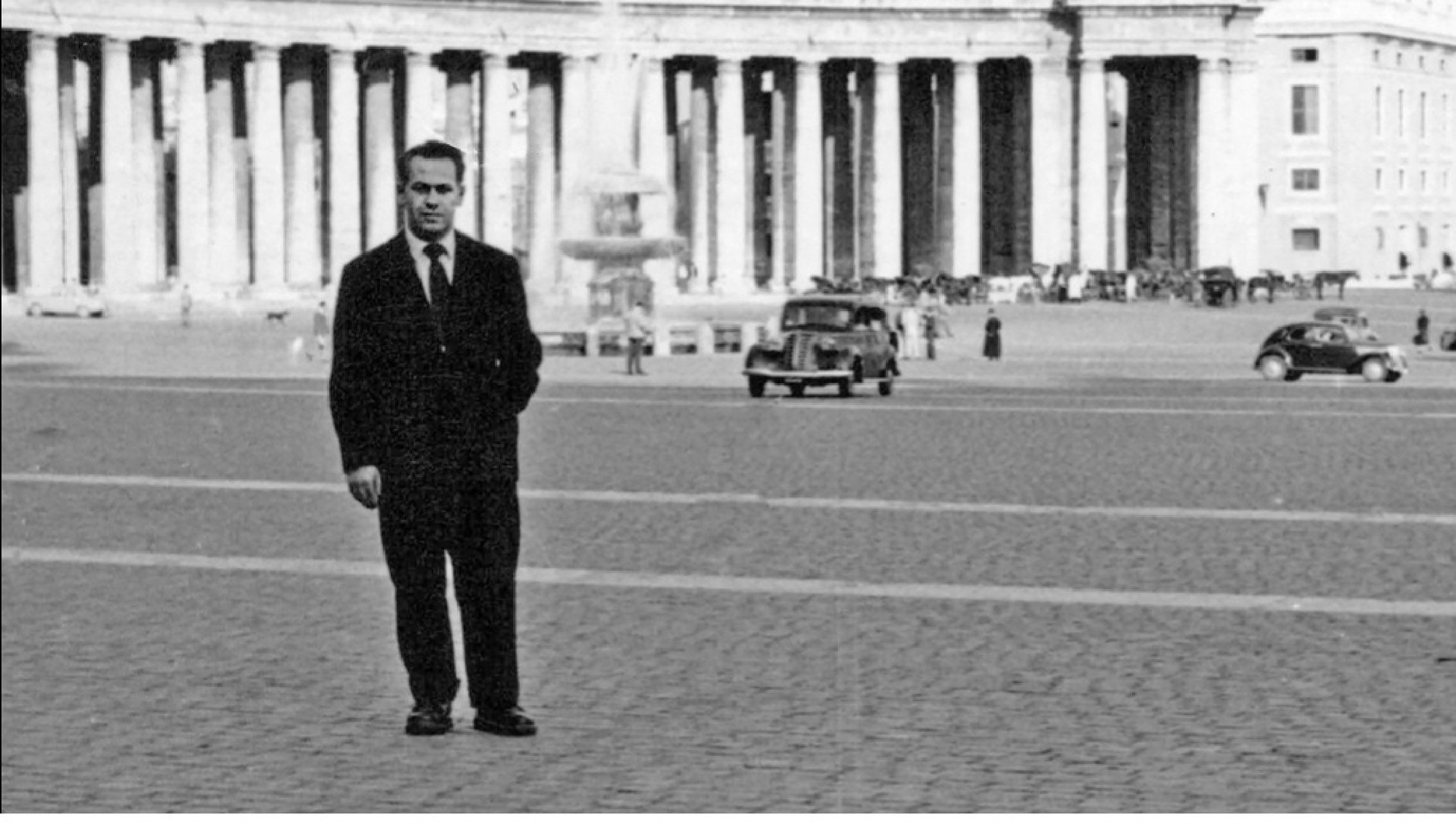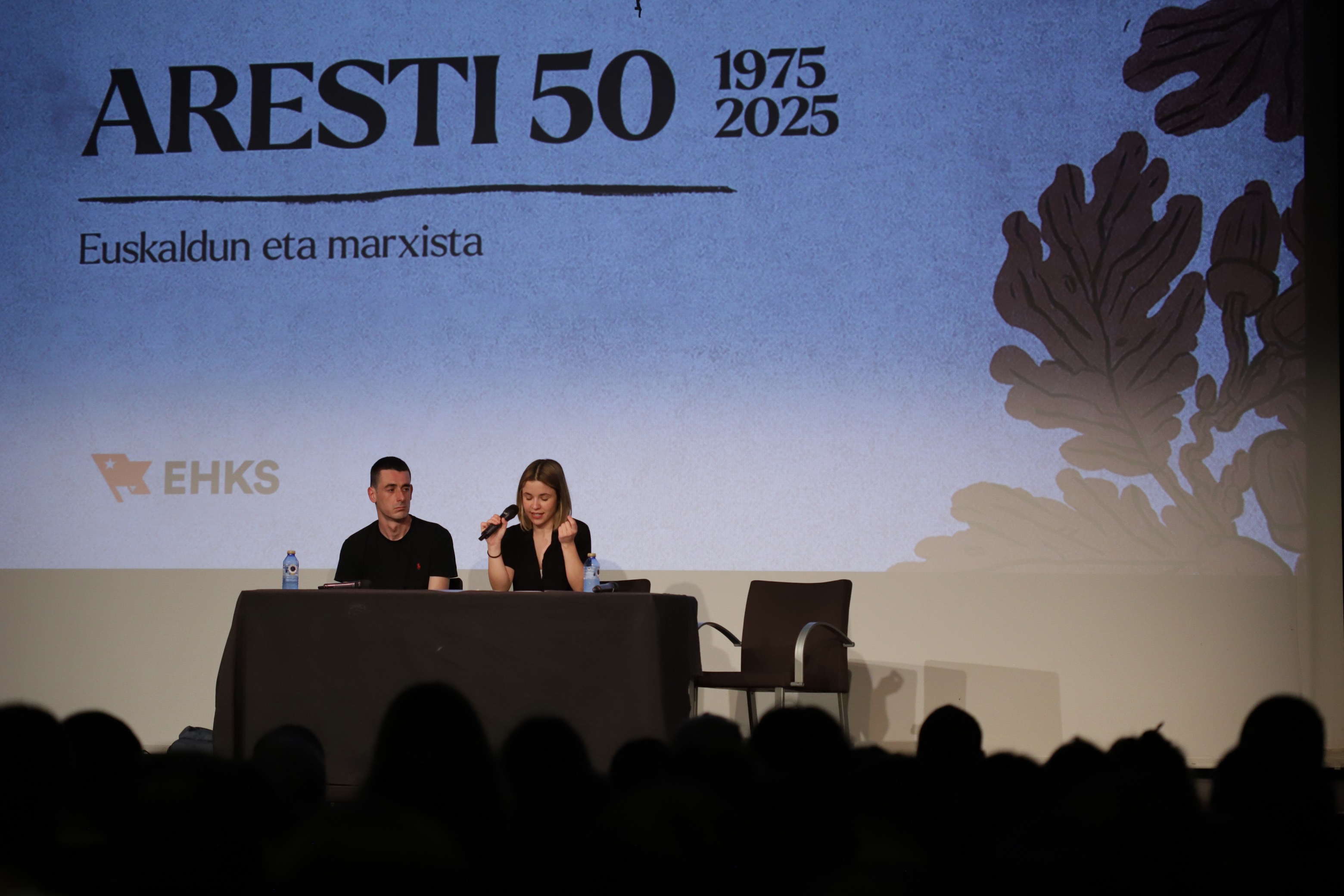"Introspection can be a deadly weapon."
- It would seem dark, starting with the same title. Estalien Gradora (Txalaparta, 2016). But three or four rays are enough to fill the path of reading with light, so that we can enjoy the creation of a delicate and stormy poet, which receives our sublime poetry.

“With the last sigh, the deepest vertex…
…the most violent, the most violent cry of covered truths that you can never say!” [Smiling, singing in a half-voice]. But in my case, as I said in the presentation, it's not the strongest cry, but the toughest as the weakest.
Are the truths covered by the Grade of the Roofs?
Somewhere. An approximation to these covert truths is, at least, a desire to investigate those truths. In the title is the echo of the beautiful poem of Xabier Lete, in tribute to Xalbador. Also from that “Goren gradora” by Etxepare: here “Behearen gradora”, or perhaps it is more appropriate to say… It is a collection of loose, or not so loose, poems carried out over the last 15-20 years, some quite predisposed, all of them Estalien Gradora filtered, yes.
The Gradora of the Cutlery or the Stalingrad?
I thought it appropriate to use the historic battle of Stalingrad as a metaphor. I remember that at the time I was reading the Life and Destiny of Vasili Grossman, and taking as a reference that I invented those two puppets or characters as serious as those appearing in the book, Niketz and Edgar, by Von Paulus, in the 6th century. The old army cape and the young blonde. This 6th Army is the metaphor of the 6th decade of my life. I used these two selfish alters to repeat what I have often done in my works: the self-criticism of my previous texts, in a reflection towards depth, or the resumption, through them.
“I’ve closed the poetry cycle. And surely from all the literature.”
Mikel Antza has interpreted poetic anthology as a theatrical representation of the play Estalien Gradora. As I read, I thought it could also be a theater play with beautiful poems.
Because it is difficult to delineate the boundaries between genders, not only today, but also for a long time – in the 19th century at least, I think since the 15th century. Sometimes the mixture is created involuntarily. What is poetry, only lyrical? What is theater, pure dialectics? The wording of Mikel Anza seems valid to me: “represented poemthology”, since the custom between the three parts contained in the book is in the form of theatre: the dialectic between these two ego alters is the “motor” of the book. Instead of the word “anthology,” I would just say “collection,” that’s right.
Your mother says she's in the book germ.
The sensation of Unheimlich, a very complicated and painful sensation is at the origin of this book. Unheimlich, that is, a very important Freudian concept, more or less and very vaguely: that delicate feeling you feel when you return to a place of your childhood in adulthood or in old age, which has more of concern than nostalgia, colliding with a restored circumstance that makes you stranger knowing you… Do you understand?
Not exactly.
Neither do I! In my case, though, unheimlich refers to the poems dedicated to the mother in the middle of the book. The sacristy of the church of St. Vincent, an iceberg in my memory. And there I was, with my V and my VI. “in armies”, holding the mother’s wheelchair, attentive to the sharp speeches before and after the mother’s Mass – in the marquis and in the mutriku – but listening to the Mass. And sometimes, after the Mass, chatting with his parish priest; although I told him that in the poem of the book “I thought, but I didn’t say it”, the drums of Buñuel’s film resonated in my brain. And also with that pederasta cure that has now become so famous. A little more from Unheimlich… Those poems are very foundational in this book. The Roof Gradora is a kind of mayonnaise that's part of those yolk yolks. Yes, listen, mayonnaise is hand-made, not with mini-pimer.
“Perhaps this book could also be defined as an attempt to silence my inner ghosts”
Reading the book, it seems that he is always asking questions about the meaning of literature and life.
I leave very well at age. If the balance is ever made, isn't it? I don’t know, however, if I’ve gone down to the “tapestands”. In some moments I think yes, there are some flashes there, in others the fog comes back in, and I go back into the darkness, not knowing if the program I've done deserves it.
And there, through the pages of the books, Niketz and Edgar, looking for definitions of poetry.
And providing contradictory definitions. I think all poets do, and all storytellers do. It seems that we cannot get rid of the need to justify in each and every book the characteristics of our work and our own person. In the section “Berbatze Enea” I had to cut the texts, my characters – Atalayeros, Peritos, Cherpolaris, etc. – because each one said his own thing in search of the definition of poetry: one in favor of socialist realism, another in favor of deepening the silence of religion… The debate that follows throughout the book is constant until I command you to keep quiet. Maybe Tapien Gradora could be defined as an attempt to silence my ghosts.

“Zuhandor,” you have the word key in this book.
“You are not able to rebel against anyone; / In anger you also live / do not want to offend anyone; / you cross yourself / you cross against you, / your waste / looking against you, quiet and strong”. In this poem of Gandiaga, and in many others, the suffering produced by mental activity is evident. Introspection can be a deadly weapon, at least conflicting in our Christian cultural tradition. "I'm also zuhandortarra! ", I said, quite emphatically, the first time I read that poem. The meaning of the word can be observed immediately in the dictionary. The symbolic tree in Basque culture: The wooden beams, where Jesus was crucified, were from the tower of the bridge. There are great abisms, that every religion – or at least the one we have met closely – in itself, the whole system of sublimation/repression that, although ideologically departs from it, is embedded in its background, I suppose, forever.
What reader remembers?
I write for you, for my tribe, for those around me, for my community. But also for myself, I feel like no one has bothered you... Do I fall into autism? I don't think so. But there's always danger, especially in poetry, that's also true. I think that's what Mikel Antza suggests to me in her intimate conversation: I should write more popular – and I fully respect it – but I get writing like this. And – I swear solemnly – it is not for épater, it is not the will to demonstrate any erudition. I admire the writers who are able to gather wisdom in a haiku. But I'm not able, my path is much more sinuous.
Has it been easy for you to write this difficult book?
It's a lot of transit work, not a game. The game, in any case, in the last stage of writing, immediately, when I remembered my children's games with Fort Apathe. This is also in the book and I already talked a lot about it at the presentation conference. That is why the images of these Indians and Yankees appear in the separata and in the inner back of the book.
“Mikel Antza suggests that I should write more popular, but I get writing like this.”
It is a striking passage in the book: serious writer, serious person, playing in childhood…
It was a flash, an inspiration or an inner murmur that the lotinant Edgar suddenly reminded caporal Niketz. "Sixty-six years, and as a child, I'm playing! And I said to myself at the time. Those moments also happen, sometimes, in the writing of a book, but you can't wait, of course, for those moments to come, because if so, you'll never write anything.
Do you think that in the future work the internal brands will also send in their writing, or that the external agents will direct you?
You have read the end of the book, you know it: “The rumor has been broken. I will need silence.” There is a certain point of dissatisfaction when Edgar tells Niketz about: “We’ve done this, but we should kill your charlatanery, poetry is something else.” For now, I have the closed poetry workshop; I have half a dozen books of written poems, and that's enough. I've closed the poetry cycle. And probably from all the literature.
A closed cycle? I have just read you a long poem, unpublished, on the border of the border, in Mugaleku.
But that's nothing, that's not a principle for a book. This is an extensive poem, the farewell to the death of a loved one named Maite. Very exciting – for me – and very different from the style of The Degree of Cutlery. I said, in another public interview, that my works are over. I'm in good health, but in courage... that's what I feel weak about. I have the sketches, I have a lot of material, but I need a very long process to make all that raw material come true and to pick it up and organize it in a book. At the moment I am doing Vide grenier, that is, “emptying the cabin”, something similar to what is often done in Iparralde, removing dust from the old storms in the cabin, organizing them, but I do not know what I am going to do with those storms.
Now that everyone has become more Franciscan than the Pope, it’s worth remembering our unsurpassed classics. There was one in the 17th century, his grace was Arnaut Oienart. And since we can’t immerse ourselves in all his works, today we will praise O.ten youth in... [+]
Aurreko tertuliako galderari erantzuteko beste modu bat izan zitekeen, akaso modu inplizituago batean, bigarren solasaldi honetako izenburua. Figura literarioaz gaindi, pertsonaia zalantzan jartzeko, edo, kontrara, pertsonaiaren testuingurua ulertzeko saiakera bat. Santi... [+]
Astelehen honetan hasita, astebetez, Jon Miranderen obra izango dute aztergai: besteren artean, Mirande nor zen argitzeaz eta errepasatzeaz gain, bere figurarekin zer egin hausnartuko dute, polemikoak baitira bere hainbat adierazpen eta testu.
Martxoaren 17an hasi eta hila bukatu bitartean, Literatura Plazara jaialdia egingo da Oiartzunen. Hirugarren urtez antolatu du egitasmoa 1545 argitaletxeak, bigarrenez bi asteko formatuan. "Literaturak plaza hartzea nahi dugu, partekatzen dugun zaletasuna ageri-agerian... [+]
1984an ‘Bizitza Nola Badoan’ lehen poema liburua (Maiatz) argitaratu zuenetik hainbat poema-liburu, narrazio eta eleberri argitaratu ditu Itxaro Borda idazleak. 2024an argitaratu zuen azken lana, ‘Itzalen tektonika’ (SUSA), eta egunero zutabea idazten du... [+]























